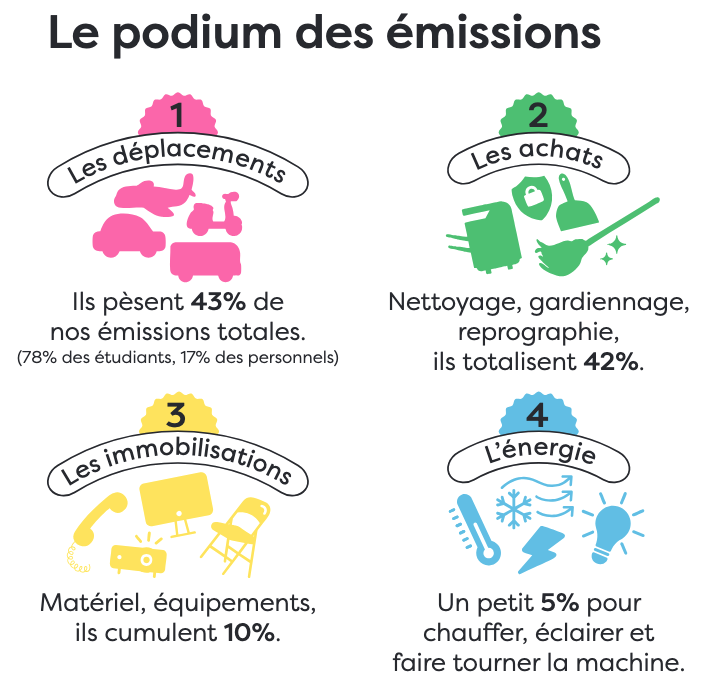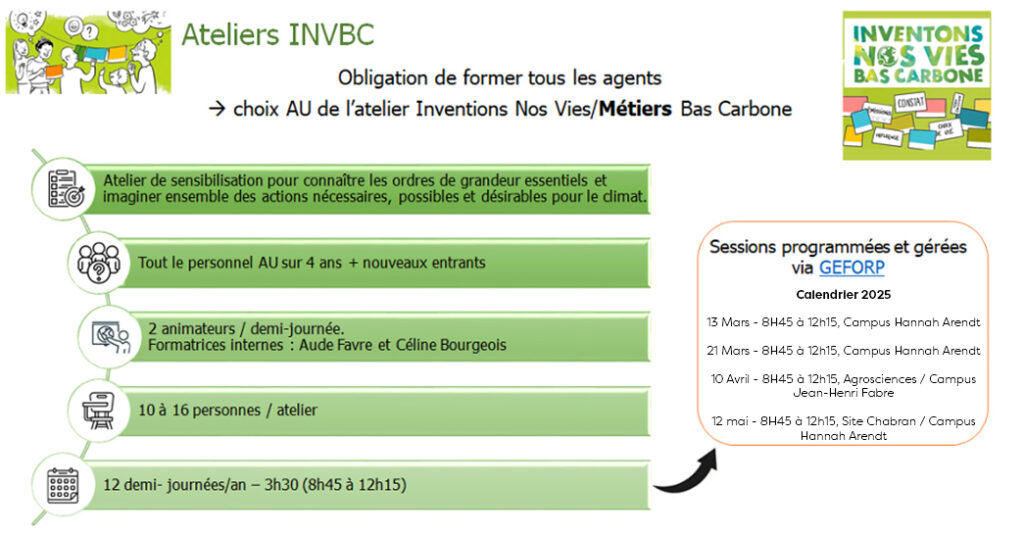Carbon footprint
What is a carbon footprint?
This is the evaluation of the quantity of greenhouse gases emitted into the atmosphere over a year by the activities of an organisation or a territory. (ADEME definition)
Avignon University undertakes to carry out its carbon footprint each year and establish a decarbonisation strategy (Action sheets 2.5.1 and 2.5.2 of the AU SDS).
Carbon footprints answer a number of key questions:
- What are the main sources of carbon emissions?
- Where should you focus your efforts?
- What action plan should be put in place to reduce these emissions?
- How can we monitor the progress of the actions undertaken?
What are greenhouse gases?
A greenhouse gas (GHG) is a gas in the atmosphere that retains some of the heat received by the sun. These gases are of natural origin and/or result from human activities. They play an essential role in maintaining a temperature compatible with life. However, an increase in their concentration leads to a rise in the average temperature and contributes to climate change.
Climate change according to the IPCC
The Intergovernmental Panel on Climate Change (IPCC) provides a clear scientific view of climate change and its impact on the environment and society. Its latest report is unequivocal: human activity is "unequivocally" responsible for global warming.
The IPCC reports for 2021 and 2022 are particularly alert to the vulnerability of Mediterranean regions such as Avignon.
A rise of 2 to 3°C would cause :
- A fall in biodiversity of 20 to 30 %
- A significant reduction in water resources
- saturation of aquatic environments with CO2 and an increase in their acidity, which would threaten entire sections of aquatic fauna
- Plant migration and the disappearance of many species in the Mediterranean region
- An increase in the risk of fire and flooding, with numerous consequences for biodiversity and ecosystems.
The 2015 Paris agreements: aiming for carbon neutrality by 2050
Based on the IPCC's recommendations, the signatory states are committed to making the necessary efforts to limit global warming to 2°C by 2100. To achieve this objective, France has committed to becoming net carbon neutral by 2050.
Avignon University's overall emissions :
In 2023, they will amount to 11,700 tonnes of CO2e.
This represents the equivalent of 1,470 round-the-world trips by car or 4,180 return flights Paris-Los Angeles.
1st position: travel :
A survey of students and staff on mobility was carried out. Statistical analysis showed that the results were reliable and could be extrapolated.
Student mobility accounts for 78% of emissions, followed by daily staff mobility for 17%. The importance of student mobility compared with that of staff is due to the difference in numbers: there are 9 times as many students as employees. If we compare emissions per person, then an employee's average travel emissions are higher than those of a student.
2nd position : purchasing :
Our carbon footprint for purchases (based on monetary ratios) shows that security and cleaning services account for more than 30% of these emissions. Establishing a collaborative working relationship with our service providers in charge of these services is therefore an important element in the decarbonisation of Avignon Université. The purchase of documentation and reprography is another area where we have identified a challenge.

Reducing our carbon footprint
Aware of our emissions, we must act collectively to reduce Avignon Université's carbon footprint and ensure a sustainable future.
Take part in the "Inventons Nos Métiers Bas Carbone" workshops!
These workshops enable you to :
- Understanding climate issues and the orders of magnitude of carbon emissions
- Devising concrete actions to reduce our impact
- Building a climate-friendly way of living and working together

Staff training: a key issue
As part of the Contract of Objectives, Means and Performance (COMP), Avignon Université is committed to training 80 % of its staff by 2027 to the challenges of environmental transition.
With Aude Favre (In charge of project support and transformation), we are rolling out the "Inventing Our Low Carbon Professions to support this transformation.
Working together for a more sustainable campus!
Updated on 7 March 2025